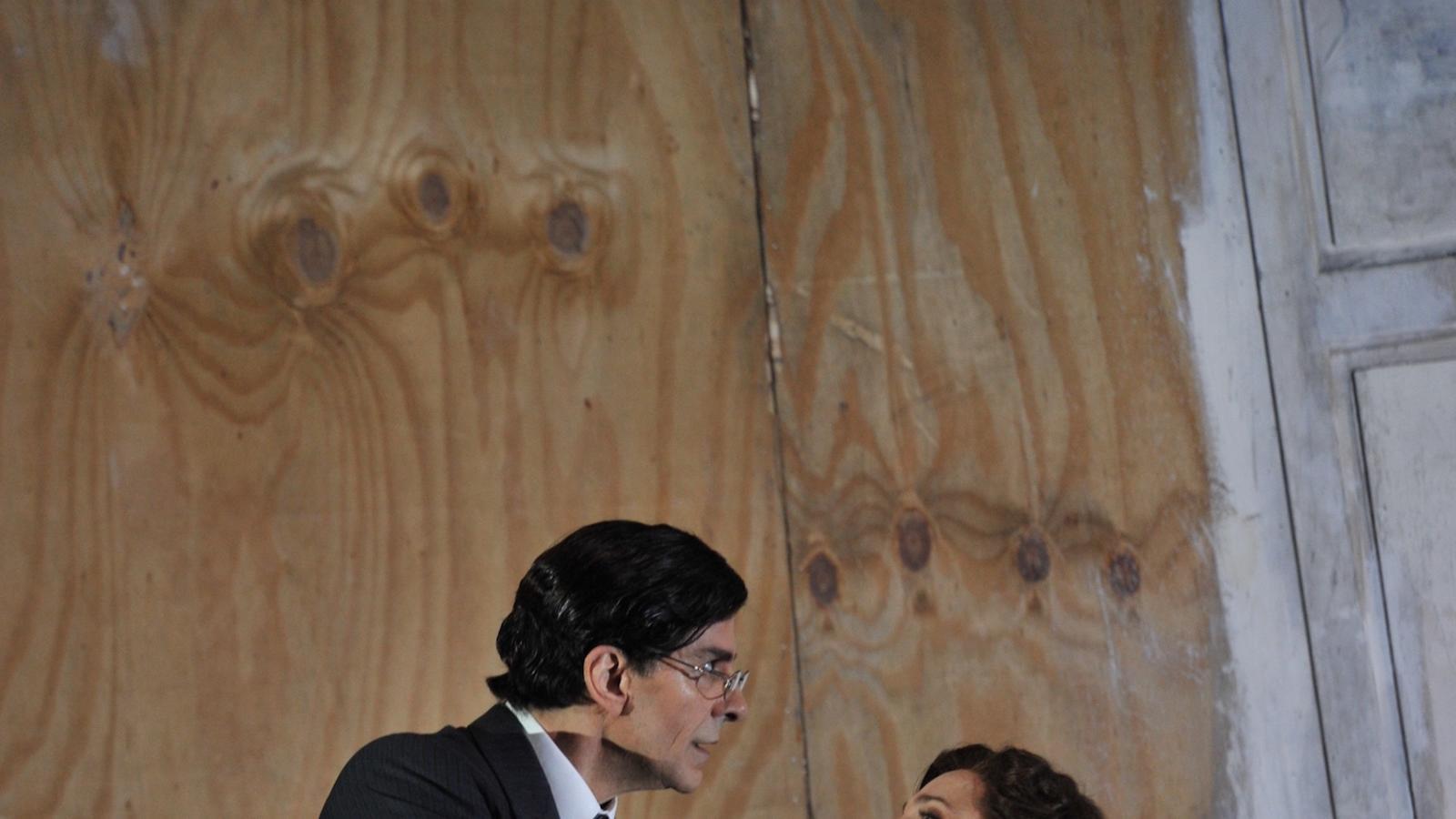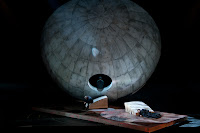
Janacek, Katia Kabanova, Liceu. Buy a ticket and see it tomorrow, it’s your last chance!
I know that is not the conventional
way to start a review, but after the performance that I saw last night, I am
not only going to start by review with that injunction, but also end with it as
well!
With a stripped-back, sparse
staging comprising intersecting planes enlivened by projection and lighting it
becomes a gaunt setting to highlight the singing of what is one of the most
complete ensemble productions of an opera that I have seen.
I have come to expect orchestral
playing of the very highest order from the Orquestra Simfònica of the Liceu,
but last night’s performance conducted by Josep Pons took their playing to
another level. They emphasised that the
music for this opera is the equivalent of a concerto for orchestra and the
whole band would have been fully justified in taking a bow on stage for the
meticulous and nuanced playing that they produced.
The soloists were dazzling with
the signal exception of Aleksander Teliga playing the boorish uncle Saviol
Prokofievitx Dikoi, wearing an absurd furry coat with top hat and cane and
failing to reach the level of professional fullness of his accompanying cast. Perhaps his cartoonish appearance and stilted
acting was intentional as many of the other characters appeared more suited to
melodrama or Expressionism than naturalism.
A case in point would be Rosie
Aldridge’s chilling portrayal of the domineering mother-figure Marfa Ignatievna
Kabanova, presented as a stage villain in tight fitting black bombazine and
sung with the sort vicious relish that meant that when she came on stage at the
end of the performance to take her well deserved ovation there were boos for
the Mother’s character mixed with the enthusiastic applause for her superlative
singing and portrayal! A true accolade!
Her character had been fleshed
out by an interlude with the Saviol character where she showed herself as a
hard drinking, straight from the bottle dominatrix, at one point straddling Saviol,
threatening him with his own cane and producing gurgles of delight from the
prone character as the curtain fell!
In another staging detail, this production
chose not to include the iconic moment at the end of the opera where, after the
suicide of her daughter-in-law, with the drowned body at her feet, Marfa bows
to the workers who had searched for the corpse.
In this production she remains still until her right hand shoots out,
demanding the hand of her grieving son, whom she then leads away from his dead
wife into the darkness of the wings. An
electric - and truly horrible moment too.
Tikhon, sung by Francisco Vas, as
the ineffectual and mother-dominated cypher of a husband, was initially
disconcerting because of his resemblance to William Rees-Mogg, another
ineffectually destructive character: lean rectitude masking dark forces! He sung the role with the confused passion
exactly matching his confused, damaged character, expertly juggling the
contradictory complexities that he is too weak to surmount.
But the evening belonged to
Katia, sung by Patricia Racette, who claimed the role for herself singing with
the sort of confidence and assurance that allowed her, paradoxically, to
portray the self-destructive repression and lethal freedom, the sensitivity, sympathy
rejected and half-understood, the full passion and hesitancy with a range of expression
that was breath-taking in its scope and effortless delivery.
The recipient of her love, Boris
Grigorievitx, nephew to Saviol, sung by Nikolai Schukoff, was presented as a
spiv-like, gigolo, Latin lover, smooth, cigarette smoking, spoilt “rich” boy
who can’t get his hands on his inheritance, frustrated and bored in a
provincial small town – certainly not a man to lose your life over, but
superficially attractive – and brilliantly sung and confidently acted. The attraction between Boris and Katia was
convincingly displayed and the scene of the assignation when Katia takes off
her coat and reveals that she is wearing an evening dress with butterfly-like
gauze ‘wings’ emphasised the incongruity of the match, and perhaps the
inevitability of the fatal attraction as she was caught, insect like by her
investment of the light of love in Boris.
Vania Kudriaix, the other lover
in this opera, sung by Josep-Ramon Olivé, is a contrast to Boris. Vania is a writer and finds beauty in nature
and expresses himself in folk song, you feel that he has more authenticity than
Boris will ever have. Olivé possessed
the role and through excellent singing, spirited dancing and a rounded
performance made the character appealing and real.
He was matched in singing and acting
by his lover Varvara, sung by Michaela Selinger, who portrayed a repressed
semi-adolescent at last breaking free from the tyrannical hold of her adopted
mother with élan. These two had some of
the most lyrical sung moments in the opera and were a delight to watch and
listen to. Her first appearance,
returning from Church, was accompanied by a (real) small dog on a lead – an
interesting coup de theatre in a live opera, and I suppose it was to show that she
was a more expressive character, to prepare us for the love affair that had
already started. But would Marfa have
allowed a mere dog as a plaything, something so purely decorative and useless
in such a regimented household? I am not
sure, and anyway, I think that for the dog to be introduced, it should have had
some sort of continuing role as a living metaphor at other points in the drama.
The chorus has a small, but
essential role in this opera and their spectral voices added to the music
richness of the music.
As the sets were so stark, the
lighting played an essential scene setting character. At times the use of shadow reminded me to
Murnau’s 1922 film of Nosferatu with
characters throwing looming outlines, large and threatening.
The climactic suicide of Katia throwing
herself into the Volga was a true spread-eagled jump – no walking down hidden
stairs here on the far side of the set but a full body, break taking leap.
For me, this is the sort of
production that justifies opera as an art form, a true combination of music,
drama, spectacle. The production played
straight through with no intermissions, and lasted a doable one hour,
forty-five minutes. A triumph.
Janacek, Katia Kabanova, Liceu. Buy a
ticket and see it tomorrow, it’s your last chance!


